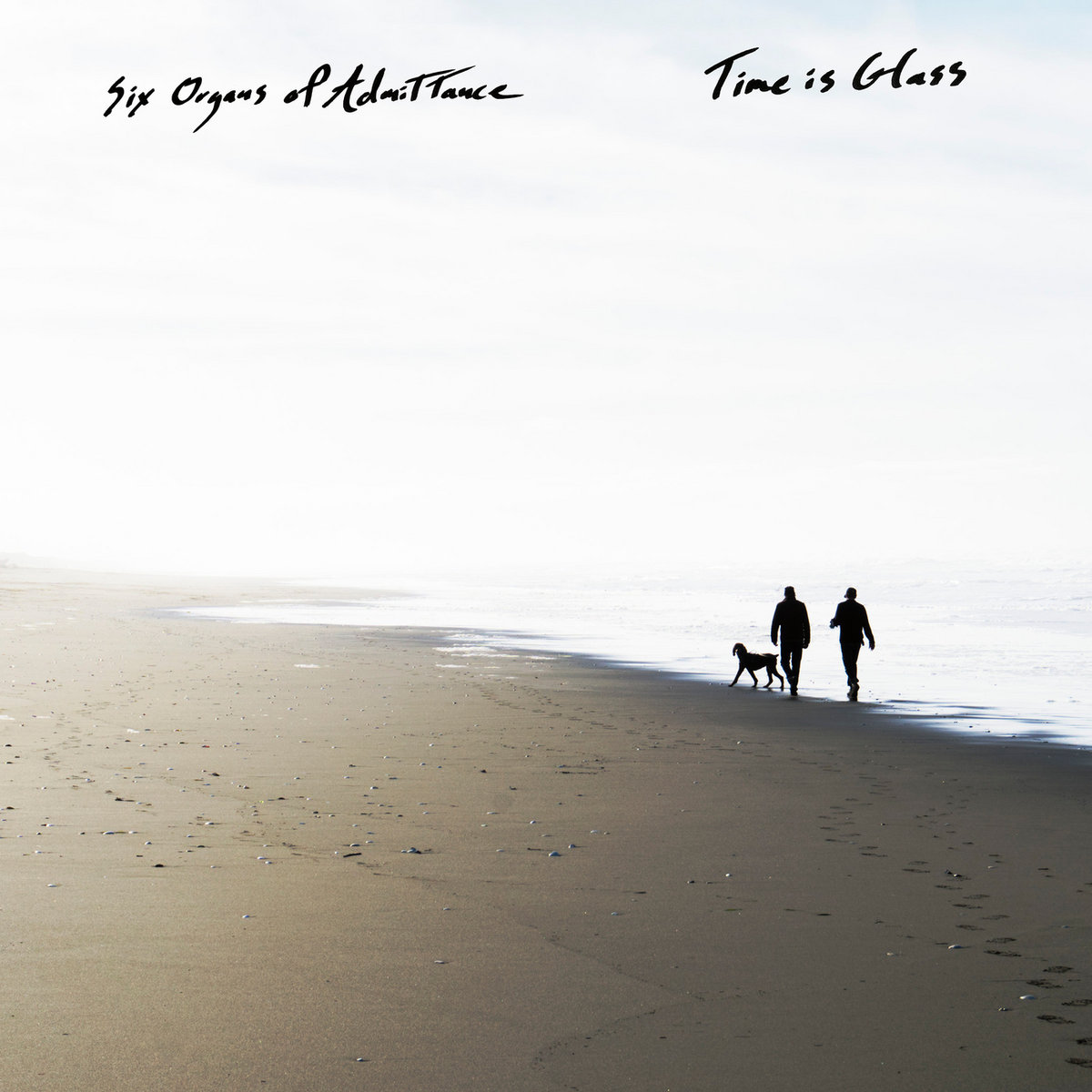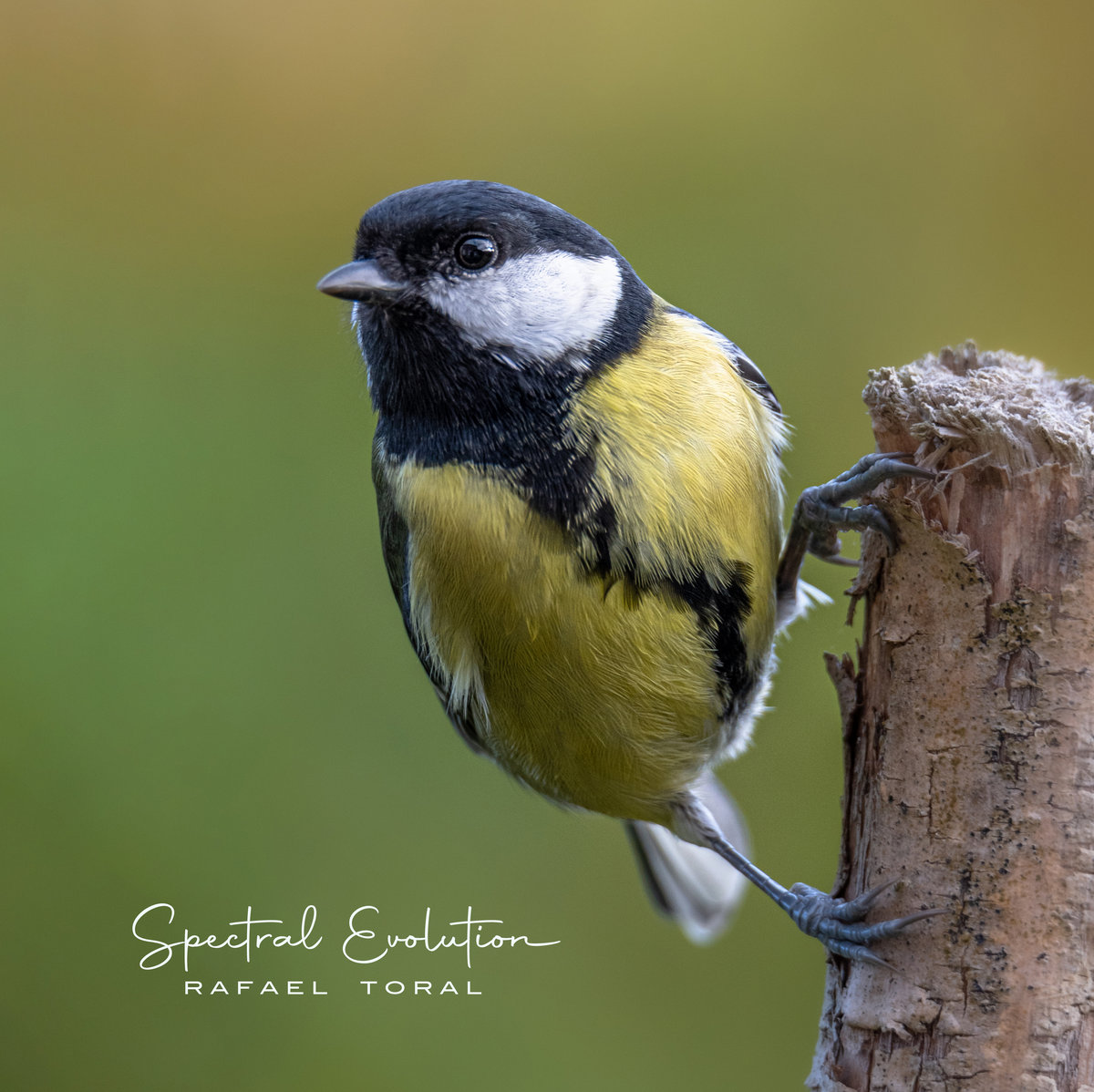- Anthony D'Amico
- Albums and Singles
 This unusual drum and guitar duo first surfaced back in the dark days of early 2020 with The Quickening, which they boldly recorded without ever having previously performed together. Obviously, both artists are seasoned improvisers and excellent musicians, but I was still taken aback by the instant and incredible chemistry on pieces like that album's title track. Given the significant hurdles like distance, touring schedules, and other collaborations, it understandably took quite some time before the opportunity to reconvene presented itself, but the duo finally managed to meet up in White's native Australia in 2022 for some recording sessions in the coastal town of Point Lonsdale. The resultant album feels a bit different from its predecessor for a couple of reasons (no acoustic guitars this time around, "big change of vibe and scenery"), but the three-part "Bitterroot Valley Suite" beautifully recaptures the magic and spontaneity of the pair's debut while also breaking some very compelling new ground.
This unusual drum and guitar duo first surfaced back in the dark days of early 2020 with The Quickening, which they boldly recorded without ever having previously performed together. Obviously, both artists are seasoned improvisers and excellent musicians, but I was still taken aback by the instant and incredible chemistry on pieces like that album's title track. Given the significant hurdles like distance, touring schedules, and other collaborations, it understandably took quite some time before the opportunity to reconvene presented itself, but the duo finally managed to meet up in White's native Australia in 2022 for some recording sessions in the coastal town of Point Lonsdale. The resultant album feels a bit different from its predecessor for a couple of reasons (no acoustic guitars this time around, "big change of vibe and scenery"), but the three-part "Bitterroot Valley Suite" beautifully recaptures the magic and spontaneity of the pair's debut while also breaking some very compelling new ground.
- Anthony D'Amico
- Albums and Singles
 Despite her slim discography, Montreal-based Myriam Gendron has quietly amassed a very passionate following over the last few years, which is quite an impressive feat given that she frequently sings in French and the bulk of her previous oeuvre was devoted to interpretations of French/Québécois traditional music or Dorothy Parker poems. Obviously, such fare is quite far from the zeitgeist of the present time, but that is a big part of Gendron's allure: her work taps into a deeper and more timeless vein that captures the joy and pain of being alive in an unusually profound and direct way. Those same themes unsurprisingly remain central on Mayday (it was assembled in the wake of her mother's passing), but this third album is Gendron's first to focus primarily on her own original compositions as well as her first release to be professionally recorded in an actual studio. To celebrate that auspicious occasion, Gendron is joined by a host of talented collaborators like Dirty Three's Jim White, Body/Head's Bill Nace, and Marisa Anderson. Characteristically, the result is yet another absolutely mesmerizing Myriam Gendron album.
Despite her slim discography, Montreal-based Myriam Gendron has quietly amassed a very passionate following over the last few years, which is quite an impressive feat given that she frequently sings in French and the bulk of her previous oeuvre was devoted to interpretations of French/Québécois traditional music or Dorothy Parker poems. Obviously, such fare is quite far from the zeitgeist of the present time, but that is a big part of Gendron's allure: her work taps into a deeper and more timeless vein that captures the joy and pain of being alive in an unusually profound and direct way. Those same themes unsurprisingly remain central on Mayday (it was assembled in the wake of her mother's passing), but this third album is Gendron's first to focus primarily on her own original compositions as well as her first release to be professionally recorded in an actual studio. To celebrate that auspicious occasion, Gendron is joined by a host of talented collaborators like Dirty Three's Jim White, Body/Head's Bill Nace, and Marisa Anderson. Characteristically, the result is yet another absolutely mesmerizing Myriam Gendron album.
- Anthony D'Amico
- Albums and Singles
 This latest boxed set to emerge from Will Long's Celer reissue campaign celebrates one of the project's more recent works, as It Would Be Giving Up was originally released as a digital-only album back in late 2020. As was the case with previous reissues, the album has been remastered by Stephan Mathieu, but the more exciting bit is that I had never actually heard this particular album before and it instantly became my favorite Celer release by a wide margin. That makes sense, as according to Long, It Would Be Giving Up is thematically tied to two of Celer's other recent classics (Future Predictions and Memory Repetitions), as the three albums focus upon "ensemble pieces made with tape loops and analog instruments" and share a certain "wall of sound" aesthetic. While my love of Future Predictions is well-documented and remains as strong as ever, I now believe that It Would Be Giving Up is the single most essential album in Celer's entire discography, as it beautifully transcends the ambient/drone milieu to strain towards ecstatic heartache as high art.
This latest boxed set to emerge from Will Long's Celer reissue campaign celebrates one of the project's more recent works, as It Would Be Giving Up was originally released as a digital-only album back in late 2020. As was the case with previous reissues, the album has been remastered by Stephan Mathieu, but the more exciting bit is that I had never actually heard this particular album before and it instantly became my favorite Celer release by a wide margin. That makes sense, as according to Long, It Would Be Giving Up is thematically tied to two of Celer's other recent classics (Future Predictions and Memory Repetitions), as the three albums focus upon "ensemble pieces made with tape loops and analog instruments" and share a certain "wall of sound" aesthetic. While my love of Future Predictions is well-documented and remains as strong as ever, I now believe that It Would Be Giving Up is the single most essential album in Celer's entire discography, as it beautifully transcends the ambient/drone milieu to strain towards ecstatic heartache as high art.
- Anthony D'Amico
- Albums and Singles
 Will Long's ambitious campaign to remaster and reissue key highlights from Celer's overwhelmingly vast discography continues with this expanded reincarnation of 2009's Engaged Touches (appropriately released on fellow ex-pat/ambient artist Ian Hawgood's Home Normal label during its Japan-based era). The album is an especially noteworthy release within the Celer canon for a couple of reasons, but the big one is that it ranks alongside 2008's Discourses of the Withered and 2019's Xièxie as one of the project's perennial fan favorites. While my own pantheon of essential Celer albums does not always align with that of said fanbase, this one's prominent place makes sense, as it was definitely one of the most high-profile albums released during the white-hot height of Celer-mania. As such, it was probably one of the first Celer albums that many people heard. It is also inarguably one of the strongest albums recorded during the project's early days as a husband-and-wife duo with Danielle Baquet-Long (Chubby Wolf) and most of the other contenders were not yet widely available before Bandcamp transformed the musical landscape. Given that, a reissue was both welcome and inevitable, but those who already love this album will likely be thrilled by the prospect of hearing it in its newly expanded and remastered form.
Will Long's ambitious campaign to remaster and reissue key highlights from Celer's overwhelmingly vast discography continues with this expanded reincarnation of 2009's Engaged Touches (appropriately released on fellow ex-pat/ambient artist Ian Hawgood's Home Normal label during its Japan-based era). The album is an especially noteworthy release within the Celer canon for a couple of reasons, but the big one is that it ranks alongside 2008's Discourses of the Withered and 2019's Xièxie as one of the project's perennial fan favorites. While my own pantheon of essential Celer albums does not always align with that of said fanbase, this one's prominent place makes sense, as it was definitely one of the most high-profile albums released during the white-hot height of Celer-mania. As such, it was probably one of the first Celer albums that many people heard. It is also inarguably one of the strongest albums recorded during the project's early days as a husband-and-wife duo with Danielle Baquet-Long (Chubby Wolf) and most of the other contenders were not yet widely available before Bandcamp transformed the musical landscape. Given that, a reissue was both welcome and inevitable, but those who already love this album will likely be thrilled by the prospect of hearing it in its newly expanded and remastered form.
- Anthony D'Amico
- Albums and Singles
 This latest release from Ben Chasney's shapeshifting and long-running psych project is billed as a sort of homecoming album, as Chasney recently moved back to California's famed Humboldt County region after a few decades away. As befits an album recorded on a picturesque coast best known for weed and beautiful redwood forests, Time Is Glass is an especially intimate, casual, and mellow Six Organs album (the cover art of a beachside dog walk captures the tone quite nicely, I think). Admittedly, that softer side of Six Organs is usually not my cup of tea (I am a fundamentally un-mellow person), but I genuinely appreciate Chasney's passion for continual evolution and reinvention and there is already a sizable backlog of Six Organs material that falls more in my comfort zone. As such, I am always willing to indulge Chasney's erratic muse wherever it may lead. More importantly, I consider Chasney to be something of a fitful and unpredictable guitar visionary: there are admittedly plenty of Six Organs songs that leave me cold, but it is never safe to assume that a new Chasney album will be devoid of flashes of brilliance. In keeping with that theme, Time Is Glass is a bit of an uneven album for me, but it does feature two sustained flashes of brilliance that rank among Chasney's finest work.
This latest release from Ben Chasney's shapeshifting and long-running psych project is billed as a sort of homecoming album, as Chasney recently moved back to California's famed Humboldt County region after a few decades away. As befits an album recorded on a picturesque coast best known for weed and beautiful redwood forests, Time Is Glass is an especially intimate, casual, and mellow Six Organs album (the cover art of a beachside dog walk captures the tone quite nicely, I think). Admittedly, that softer side of Six Organs is usually not my cup of tea (I am a fundamentally un-mellow person), but I genuinely appreciate Chasney's passion for continual evolution and reinvention and there is already a sizable backlog of Six Organs material that falls more in my comfort zone. As such, I am always willing to indulge Chasney's erratic muse wherever it may lead. More importantly, I consider Chasney to be something of a fitful and unpredictable guitar visionary: there are admittedly plenty of Six Organs songs that leave me cold, but it is never safe to assume that a new Chasney album will be devoid of flashes of brilliance. In keeping with that theme, Time Is Glass is a bit of an uneven album for me, but it does feature two sustained flashes of brilliance that rank among Chasney's finest work.
- Anthony D'Amico
- Albums and Singles
 This collaboration has its origins in a sold-out opening night show from Madrid's 2023 SoundSet series, as Irisarri and Guido Zen tore the roof off the Condeduque cultural center ambient-style with their encore duet. Naturally, that intense performance ("Waking Up Dizzy on a Bastion") is included here for the benefit of hapless chumps like me who were on the wrong continent that night, but the experience inspired the two artists to keep their partnership going afterwards (albeit remotely). That continued creative union eventually resulted in a longform studio piece ("Place of Forever") that is every bit as impressive as the Madrid performance, if not even better. Unsurprisingly, I have been a fan of both artists for quite some time and this album is one of those rare times in which an ostensible match made in heaven actually sounds as absolutely mesmerizing as I hoped it would. This album is pure blackened drone nirvana.
This collaboration has its origins in a sold-out opening night show from Madrid's 2023 SoundSet series, as Irisarri and Guido Zen tore the roof off the Condeduque cultural center ambient-style with their encore duet. Naturally, that intense performance ("Waking Up Dizzy on a Bastion") is included here for the benefit of hapless chumps like me who were on the wrong continent that night, but the experience inspired the two artists to keep their partnership going afterwards (albeit remotely). That continued creative union eventually resulted in a longform studio piece ("Place of Forever") that is every bit as impressive as the Madrid performance, if not even better. Unsurprisingly, I have been a fan of both artists for quite some time and this album is one of those rare times in which an ostensible match made in heaven actually sounds as absolutely mesmerizing as I hoped it would. This album is pure blackened drone nirvana.
- Creaig Dunton
- Albums and Singles
 Across the 16 songs that make up this album, the title makes perfect sense: a myriad of abstract, expansive pieces, full-fledged songs, and odd little miniatures. All of them are linked together with Robert Poss's infinite love for the electric guitar, however, and as a whole, it encapsulates much of the sound he has cultivated throughout his entire career.
Across the 16 songs that make up this album, the title makes perfect sense: a myriad of abstract, expansive pieces, full-fledged songs, and odd little miniatures. All of them are linked together with Robert Poss's infinite love for the electric guitar, however, and as a whole, it encapsulates much of the sound he has cultivated throughout his entire career.
- Anthony D'Amico
- Albums and Singles
 I believe I stumbled upon Moonshake's singular 1992 debut full-length by blind luck at a used record store, but I cannot remember if I picked it up because I was already vaguely aware that Margaret Fiedler was cool or if it was still pre-Laika. In any case, I always thought of Moonshake primarily as Fieldler's alternately frustrating and brilliant first band. In hindsight, however, I failed to appreciate how truly radical this foursome were during their brief flourish and dearly wish that I had dug a bit deeper back then, as Eva Luna could have (and should have) been my gateway into an amazing world of killer underground music that I was not yet aware of (krautrock, post-punk, free jazz, Jamaican dub, and even the C86 scene). Listening to this expanded reissue now with considerably more adventurous ears, I still find this album oft-frustrating, but I am newly struck by how almost every song features at least one moment where Moonshake sounded like the best band on the goddamn planet. That white-hot inspiration did not always sustain itself for an entire song, but this reissue beautifully strengthens the original album with some welcome gems from the band's early EPs.
I believe I stumbled upon Moonshake's singular 1992 debut full-length by blind luck at a used record store, but I cannot remember if I picked it up because I was already vaguely aware that Margaret Fiedler was cool or if it was still pre-Laika. In any case, I always thought of Moonshake primarily as Fieldler's alternately frustrating and brilliant first band. In hindsight, however, I failed to appreciate how truly radical this foursome were during their brief flourish and dearly wish that I had dug a bit deeper back then, as Eva Luna could have (and should have) been my gateway into an amazing world of killer underground music that I was not yet aware of (krautrock, post-punk, free jazz, Jamaican dub, and even the C86 scene). Listening to this expanded reissue now with considerably more adventurous ears, I still find this album oft-frustrating, but I am newly struck by how almost every song features at least one moment where Moonshake sounded like the best band on the goddamn planet. That white-hot inspiration did not always sustain itself for an entire song, but this reissue beautifully strengthens the original album with some welcome gems from the band's early EPs.
- Anthony D'Amico
- Albums and Singles
 This album is definitely one of the more unlikely underground hits to cross my path in recent memory, as this strikingly unique bagpipe performance first quietly surfaced as an extremely limited CDr back in 2017 on Strasbourg's Soleils Bleus label. Last year, however, it got a well-deserved vinyl resurrection on Belgium's forward-thinking Morc Records and it sold out almost immediately (as did last month's repress, unsurprisingly). Notably, the bagpipe has historically not been my favorite instrument, but I've said the same thing in the past about harps and harpsichords only to have my mind blown by Joanna Newsom, Mary Lattimore, and Catherine Christer Hennix, so this is merely the latest revelation that any instrument can sound amazing in the right hands. I also never expected the French traditional music scene to be the source of so many stellar contemporary albums, yet Lise and Lisa have just joined my personal pantheon of Gallic folkies (France, Tanz Mein Herz, etc.) who have dropped killer left-field psych gems in recent years. That is an especially impressive feat for Kaüffert, given that she is a German bagpiper.
This album is definitely one of the more unlikely underground hits to cross my path in recent memory, as this strikingly unique bagpipe performance first quietly surfaced as an extremely limited CDr back in 2017 on Strasbourg's Soleils Bleus label. Last year, however, it got a well-deserved vinyl resurrection on Belgium's forward-thinking Morc Records and it sold out almost immediately (as did last month's repress, unsurprisingly). Notably, the bagpipe has historically not been my favorite instrument, but I've said the same thing in the past about harps and harpsichords only to have my mind blown by Joanna Newsom, Mary Lattimore, and Catherine Christer Hennix, so this is merely the latest revelation that any instrument can sound amazing in the right hands. I also never expected the French traditional music scene to be the source of so many stellar contemporary albums, yet Lise and Lisa have just joined my personal pantheon of Gallic folkies (France, Tanz Mein Herz, etc.) who have dropped killer left-field psych gems in recent years. That is an especially impressive feat for Kaüffert, given that she is a German bagpiper.
- Anthony D'Amico
- Albums and Singles
 Before I heard this album, I mistakenly believed that I had a reasonable familiarity with Rafael Toral's oeuvre, as I had heard and enjoyed a handful of his classic guitar-era albums such as 2001's Violence of Discovery and Calm of Acceptance. That said, it had been a while since I had kept tabs on his work, so I was quite curious to hear what made this "quintessential album of guitar music" exciting enough to reawaken Jim O'Rourke's decades-dormant Moikai label. As it turns out, absolutely everything about Spectral Evolution feels like a goddamn revelation to me and I am now kicking myself for sleeping on Toral's post-guitar Space Program-era of experimentation with self-built instruments. The psychotropic omnipresence of those self-built instruments makes it amusingly misleading to call Spectral Evolution Toral's return to guitar music, but if the presence of some recognizable guitar sounds lures more listeners towards this one-of-a-kind work of genius, I believe that claim has served a worthy purpose. Listening to this album was like hearing classic Merzbow or My Cat Is An Alien for the first time, as Toral plays entirely by his own set of rules and succeeds spectacularly.
Before I heard this album, I mistakenly believed that I had a reasonable familiarity with Rafael Toral's oeuvre, as I had heard and enjoyed a handful of his classic guitar-era albums such as 2001's Violence of Discovery and Calm of Acceptance. That said, it had been a while since I had kept tabs on his work, so I was quite curious to hear what made this "quintessential album of guitar music" exciting enough to reawaken Jim O'Rourke's decades-dormant Moikai label. As it turns out, absolutely everything about Spectral Evolution feels like a goddamn revelation to me and I am now kicking myself for sleeping on Toral's post-guitar Space Program-era of experimentation with self-built instruments. The psychotropic omnipresence of those self-built instruments makes it amusingly misleading to call Spectral Evolution Toral's return to guitar music, but if the presence of some recognizable guitar sounds lures more listeners towards this one-of-a-kind work of genius, I believe that claim has served a worthy purpose. Listening to this album was like hearing classic Merzbow or My Cat Is An Alien for the first time, as Toral plays entirely by his own set of rules and succeeds spectacularly.
- Anthony D'Amico
- Albums and Singles
 I tend to enjoy damn near everything that Sweden's XKatedral label releases, but this half-disturbing/half-transcendent tour de force by co-founder Maria W. Horn still managed to completely blindside me. Panoptikon's four-part suite was originally composed for a macabre installation at the "disbanded Vita Duvan (White Dove) panopticon prison in Luleå, Sweden." Being a panopticon, Vita Duvan had an unusual circular design "to create a sense of omniscient surveillance," but that is just the tip of a very grim iceberg, as it was also known for its brutal isolation tactics as well as rampant torture and execution. While the prison mercifully ceased operations in 1979, I suspect I would've needed months of therapy to recover from Horn's installation alone, as it pulsed in synchronization with the prison's lights and the cells contained speakers broadcasting the imagined voices of the doomed prisoners. Thankfully, the decontextualized album is considerably less harrowing than its origin suggests, as its dark choral opening quickly expands into an immersive swirl of heady drones, spacy synths, and timelessly beautiful vocal motifs.
I tend to enjoy damn near everything that Sweden's XKatedral label releases, but this half-disturbing/half-transcendent tour de force by co-founder Maria W. Horn still managed to completely blindside me. Panoptikon's four-part suite was originally composed for a macabre installation at the "disbanded Vita Duvan (White Dove) panopticon prison in Luleå, Sweden." Being a panopticon, Vita Duvan had an unusual circular design "to create a sense of omniscient surveillance," but that is just the tip of a very grim iceberg, as it was also known for its brutal isolation tactics as well as rampant torture and execution. While the prison mercifully ceased operations in 1979, I suspect I would've needed months of therapy to recover from Horn's installation alone, as it pulsed in synchronization with the prison's lights and the cells contained speakers broadcasting the imagined voices of the doomed prisoners. Thankfully, the decontextualized album is considerably less harrowing than its origin suggests, as its dark choral opening quickly expands into an immersive swirl of heady drones, spacy synths, and timelessly beautiful vocal motifs.

